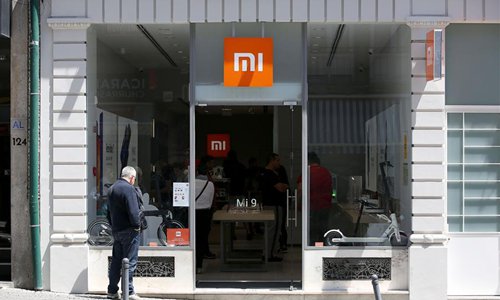
People visit a newly-opened Mi store in Porto, Portugal, on June 15, 2019. Chinese technology company Xiaomi opened its first official Mi store in Porto on June 1. (Photo: Xinhua)
Germany will reportedly investigate the cyber security status of some Chinese mobile phones, following a recent report by Lithuania's Defense Ministry accusing that phones produced by Chinese vendor Xiaomi sold in Europe have a built-in ability to censor content.Germany's move in expressing support for Lithuania, the "anti-China vanguard" in Europe, is driven more by politics than technology, as the Western European power wants to shift some of the pressure it now faces in the EU while try to maintain its leading position in the bloc, experts said. They added that the so-called probe is likely to end in vain.
A spokesperson for the German Federal Office for Information Security confirmed the launch of the probe to the newswire DPA, the Politico reported on Sunday, citing German news portal Tagesschau.
The investigation came after Lithuania's accusation, which analyzed Chinese phones including Huawei's P40 5G, Xiaomi's Mi 10T 5G as well as the OnePlus 8T 5G mobile phone models. Lithuania urged its consumers to avoid buying Chinese mobile phones or throw them away if they had owned one.
"If those Chinese phones have any problems, it should have been found first in other EU countries like Germany where information technology is more advanced than in Lithuania," Cui Hongjian, director of the Department of European Studies, China Institute of International Studies, told the Global Times on Sunday.
"The German move carries more of a political tone, as the country wants to shift some of the pressure it faces internally in the EU when it comes to concerns about China, while maintaining its leading position in the bloc," Cui noted, adding that playing the same trick as Lithuania will not work.
China has recalled its ambassador to Lithuania as a countermeasure in response to the Baltic country's provocation on the Taiwan question, which is a deterrent. But Lithuania is unlikely to abandon its anti-China policy in a short period, analysts said.
Xiaomi did not respond to the Global Times inquiry about the German investigation. It denied the Lithuania report last week, saying its devices do not censor communications to or from its users, and it has never and will never restrict or block any personal behavior of its smartphone users, such as searching, calling, web browsing or the use of third-party communication software.
"Xiaomi fully respects and protects the legal rights of all users and that it complies with the EU's General Data Protection Regulation (GDPR)," a spokesperson of Xiaomi said.
Xiaomi's smartphones now hold a leading position in the European market. Its share in the market rose to the second place now, putting it just behind Samsung in the first quarter with 17 percent of the market share.
Its shipments in Lithuania, Belarus, Poland and other countries in Europe ranked first.
"Investigations that have such political intentions have mostly ended in vain, and those EU countries cared more about the gesture itself or the process of investigating, instead of the result," Ma Jihua, a Beijing-based tech analyst, told the Global Times Sunday.
However, the process might weigh on the confidence of Xiaomi's business partners in Europe as they may take a wait-and-see approach about increasing inventories, Ma noted, adding that phone users or brand followers are unlikely to be affected by the investigation.
For Xiaomi, Ma estimated that the firm may re-examine its strategy in the European markets where it is enjoying a big growth. "But there is no ideal alternative at the moment."


